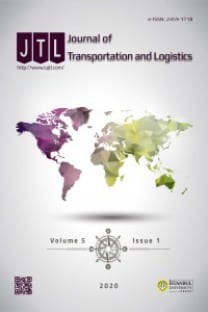Deniz Yoluyla Kömür Taşımacılığında Ölçek Ekonomileri: İSDEMİR Limanı Örneği
Nakliye işlemlerindeki taşımacılık maliyetlerinin düşük tutulmasında ölçek ekonomisi hayati bir role sahiptir. Ölçek ekonomisi birim başına taşıma maliyetlerini düşürür ve uzak mesafelerle ticaret yapılabilmesini mümkün kılar. Uzak bir ülkeden bir malın ithalatı, onu komşu ülkeden ithal etmekten daha aza mal olabilir. Bu çalışmanın amacı, bu maliyet avantajının endüstriyel firmalar tarafından ne ölçüde kullanıldığını belirlemek ve teorinin pratikteki geçerliliğini test etmektir. Bu çalışmada, teorik olarak, daha büyük gemilerin daha düşük nakliye maliyetlerine sahip olacağı varsayılmıştır ve nakliye maliyetleri ile kömür fiyatları göz ardı edilerek model basitleştirilmiştir. Başka bir deyişle, mesafe arttıkça geminin boyutu da temel hipotezimize göre artacaktır. İSDEMİR Limanı, coğrafi olarak uygun konumu ve limana yakın konumda bulunan enerji santrali için yüksek kömür ithalat hacmi nedeniyle bu çalışma için örnek olarak seçilmiştir. Analizde kullanılan veriler 2008 ve 2011 yıllarını kapsamaktadır. Bu yıllarda 313 dökme yük gemisi tarafından toplam 14.032.392 ton kömür ithal edilmiştir. İlişkinin yönünü ve derecesini belirlemek için korelasyon ve regresyon analizi yöntemleri uygulanmıştır. Yük hacim bağımlı değişken ve mesafe bağımsız değişken olarak seçilmiştir. Sonuçlar, bu değişkenler arasında güçlü anlamlı bir pozitif korelasyon olduğunu göstermektedir. Ayrıca regresyon analizi sonuçları, mesafedeki değişimin hacim değişiminin büyük kısmını açıkladığını göstermektedir.
Anahtar Kelimeler:
Ölçek Ekonomisi, Dökme Yük Taşımacılığı, Kömür Ticareti
Economies of Scale in Seaborne Coal Transportation: A Case Study of İSDEMİR Port
Economies of scale has a vital role in keeping transport costs low in shipping. It makes possible to merchandise with far destinations. Economies of scale reduces the transportation costs per unit. Importing a commodity from a far country may cost less than importing it from neighboring country. The purpose of this study is to determine the extent to which this cost advantage is used in practice by industrial firms and to test the operative field validity of the theory. In this study, it is assumed theoretically that the larger vessels would have lower transport costs and the model is simplified by eliminating transport costs and coal prices. . In other words, as the distance increases, the size of the ship will also increase according to our basic hypothesis. ISDEMIR Port is selected as a sample for this study because of its geographical proper position and its high volume of coal import for its power plant that is placed to close position to the port. The data covers the years between 2008 and 2011. In these years totally 14.032.392 tons of coal imported by 313 bulk cargo ships. Correlation and regression analysis are implemented to determine the degree of the relationship. Volume is selected as a dependent variable and distance is selected as an independent variable. Results shows that there is a strong significant positive correlation between these variables. Also regression results show that change in distance explains big proportion of change in volume.
Keywords:
Economies of Scale, Bulk Transportation, Coal Trade,
___
- Chang, M. (2014) Principles of Scientific Methods. New York: CRS Press
- Cowie, J. (2010) The Economics of Transport. USA and Canada: Routledge
- Dietz, T. and Kalof, L. (2009) Introduction to Social Statistics: The Logic of Statistical Reasoning. Singapore: Wiley-Blackwell
- Gordon, R. (2015) Regression Analysis for the Social Sciences. New York: Routledge
- Marine Traffic. https://www.marinetraffic.com/tr/. (18.06.2017)
- Panayides, P. and Song, D. (2012) Maritime Logistics. USA: Kogan Page Limited
- Stopford, M. (2009) Maritime Economics. USA and Canada: Routledge
- UDHB (Transport, Maritime Affairs and Communications Ministry), (2012), Energy Import Statistics between 2005-2011
- Wilmsmeier, G. (2014) International Maritime Transport Costs. UK: Ashgate
- Başlangıç: 2015
- Yayıncı: İstanbul Üniversitesi
Sayıdaki Diğer Makaleler
Deniz Yoluyla Kömür Taşımacılığında Ölçek Ekonomileri: İSDEMİR Limanı Örneği
Abdullah AÇIK, Sadık Özlen BAŞER
Araç Rotalama Probleminde Bulanık Hedef Programlama Yaklaşımı
Selen ÇELİKKANAT FİLİZ, Ergün EROĞLU
Toplu Ulaşım Sistemlerinde Operasyonel Etkinlik ve Hizmet Kalitesi Analizi
